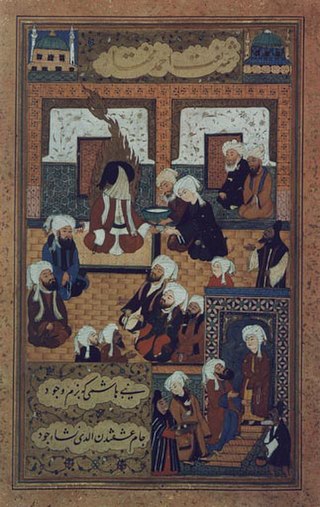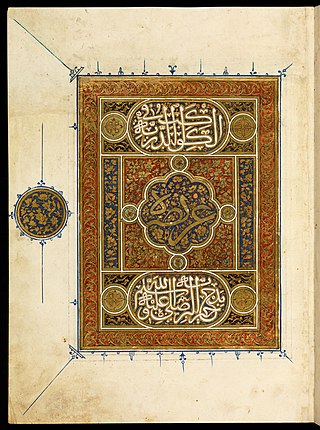
Hadith or Athar refers to what most Muslims and the mainstream schools of Islamic thought believe to be a record of the words, actions, and the silent approval of the Islamic prophet Muhammad as transmitted through chains of narrators. In other words, the ḥadīth are attributed reports about what Muhammad said and did.

Muhammad ibn Isma'il al-Bukhari was an Islamic scholar who authored the Sahih al-Bukhari, the first of the Six Books of Sunni Islam.

Al-Shafi'i was a Sunni Muslim scholar, jurist, traditionist, theologian, ascetic, and eponym of the Shafi'i school of Islamic jurisprudence. He is known to be among the first contributors to the principles of Islamic jurisprudence, having authored one of the earliest works on the subject: al-Risala. His legacy and teaching on the matter provided it with a systematic form, thereby "fundamentally influenc[ing] the succeeding generations which are under his direct and obvious impact," and "begin[ning] a new phase of the development of legal theory."

The Companions of the Prophet were the disciples and followers of Muhammad who saw or met him during his lifetime, while being a Muslim and were physically in his presence.
Abu Abd Allah Muhammad ibn Umar ibn Waqid al-Aslami was a historian commonly referred to as al-Waqidi. His surname is derived from his grandfather's name Waqid, and thus he became famous as al-Imam al-Waqidi. Al-Waqidi was an early Muslim historian and biographer of the Islamic prophet Muhammad, specializing in his military campaigns. He served as a judge (qadi) for the Abbasid caliph al-Ma'mun. Several of al-Waqidi's works are known through his scribe and student, Ibn Sa'd.

Sahih al-Bukhari is the first hadith collection of the Six Books of Sunni Islam. It was compiled by Persian scholar al-Bukhari around 846. The author was born in Bukhara in today's Uzbekistan.
Shams ad-Dīn adh-Dhahabī, also known as Shams ad-Dīn Abū ʿAbdillāh Muḥammad ibn Aḥmad ibn ʿUthmān ibn Qāymāẓ ibn ʿAbdillāh at-Turkumānī al-Fāriqī ad-Dimashqī was an Athari theologian, Islamic historian and Hadith scholar.
Al-Nasāʾī, full name Abū ʿAbd al-Raḥmān Aḥmad ibn Shuʿayb ibn ʿAlī ibn Sinān ibn Baḥr ibn Dīnar al-Khurasānī al-Nasāʾī, was a noted collector of hadith, from the city of Nasa, and the author of "As-Sunan", one of the six canonical hadith collections recognized by Sunni Muslims. From his "As-Sunan al-Kubra " he wrote an abridged version, "Al-Mujtaba" or Sunan al-Sughra. Of the fifteen books he is known to have written, six treat the science of hadīth.
Abū Hurayra ʿAbd al-Raḥmān ibn Ṣakhr al-Dawsī al-Zahrānī, commonly known as Abū Hurayra, was a companion of the Islamic prophet Muhammad and the most prolific hadith narrator in Sunni Islam.

Qasīdat al-Burda, or al-Burda for short, is a thirteenth-century ode of praise for the Islamic prophet Muhammad composed by the eminent Sufi mystic Imam al-Busiri of Egypt. The poem whose actual title is al-Kawākib ad-durriyya fī Madḥ Khayr al-Bariyya, is famous mainly in the Sunni Muslim world. It is entirely in praise of Muhammad, who is said to have been praised ceaselessly by the afflicted poet, to the point that Muhammad appeared in a dream and wrapped him in a mantle or cloak; in the morning the poet discovers that God has cured him.

Sunan al-Nasa'i is the fifth hadith collection of the Six Books of Sunni Islam. It was compiled by al-Nasa'i.

Shihāb al-Dīn Abū al-ʿAbbās Aḥmad ibn Muḥammad ibn ʿAlī ibn Ḥajar al-Haytamī al-Makkī al-Anṣārī known as Ibn Hajar al-Haytami al-Makki was a renowned Sunni Egyptian scholar. He was the leading jurist of the Shafi'i school of though, a mujtahid, muhaddith, historian and theologian. He came from the Banu Sa'd tribe who settled in the Al-Sharqiah province in Egypt. Ibn Hajar was specialized in Islamic Jurisprudence and well known as a prolific writer of the Shâfi'î school. With Shihab al-Din al-Ramli, he represents the foremost resource for fatwa for the entire late Shâfi‘î school.

Kutub al-Sittah, also known as al-Sihah al-Sitta are the six canonical hadith collections of Sunni Islam. They were compiled in the 9th-century CE.

Shaykh al-Islām was used in the classical era as an honorific title for outstanding scholars of the Islamic sciences. It first emerged in Khurasan towards the end of the 4th Islamic century. In the central and western lands of Islam, it was an informal title given to jurists whose fatwas were particularly influential, while in the east it came to be conferred by rulers to ulama who played various official roles but were not generally muftis. Sometimes, as in the case of Ibn Taymiyyah, the use of the title was subject to controversy. In the Ottoman Empire, starting from the early modern era, the title came to designate the chief mufti, who oversaw a hierarchy of state-appointed ulama. The Ottoman Sheikh al-Islam performed a number of functions, including advising the sultan on religious matters, legitimizing government policies, and appointing judges.
Al-Ḥasan ibn Muḥammad ibn al-Ḥanafiyya was one of the Salaf and a narrator of hadith.
Kaʿb al-Aḥbār (Arabic: كعب الأحبار, full name Abū Isḥāq Kaʿb ibn Maniʿ al-Ḥimyarī was a 7th-century Yemenite Jew from the Arab tribe of "Dhī Raʿīn" who converted to Islam. He was considered to be the earliest authority on Israʼiliyyat and South Arabian lore. According to Islamic tradition, he accompanied Umar in his trip from Medina to Jerusalem, and afterwards, became a supporter of Uthman. He died in Hims around 652-6AD.
Khuzayma ibn Thabit Dhu al-Shahadatayn al-Ansari was one of the companions of the Islamic prophet, Muhammad.

Hadith terminology is the body of terminology in Islam which specifies the acceptability of the sayings (hadith) attributed to the Islamic prophet Muhammad by other early Islamic figures of significance such as the companions and followers/successors. Individual terms distinguish between those hadith considered rightfully attributed to their source or detail the faults of those of dubious provenance. Formally, it has been defined by Ibn Hajar al-Asqalani as: "knowledge of the principles by which the condition of the narrator and the narrated are determined." This page comprises the primary terminology used within hadith studies.
Abu Abdillah Ibrahim bin Muhammad bin 'Urfah bin Sulaiman bin al-Mughira bin Habib bin al-Muhallab bin Abi Sufra al-Azdi better known as Niftawayh, was a Medieval Muslim scholar. He was considered to be the best writer of his time, in addition to an expert in Muslim prophetic tradition and comparative readings of the Qur'an.
Abū Sufyān Wakīʿ ibn al-Jarrāḥ ibn Malīḥ al-Ruʾāsī al-Kilābī al-Kufī (745/47–812) was a prominent hadith scholar based in Kufa. He was one of the principal teachers of the major Sunni Muslim jurist Ahmad ibn Hanbal.







